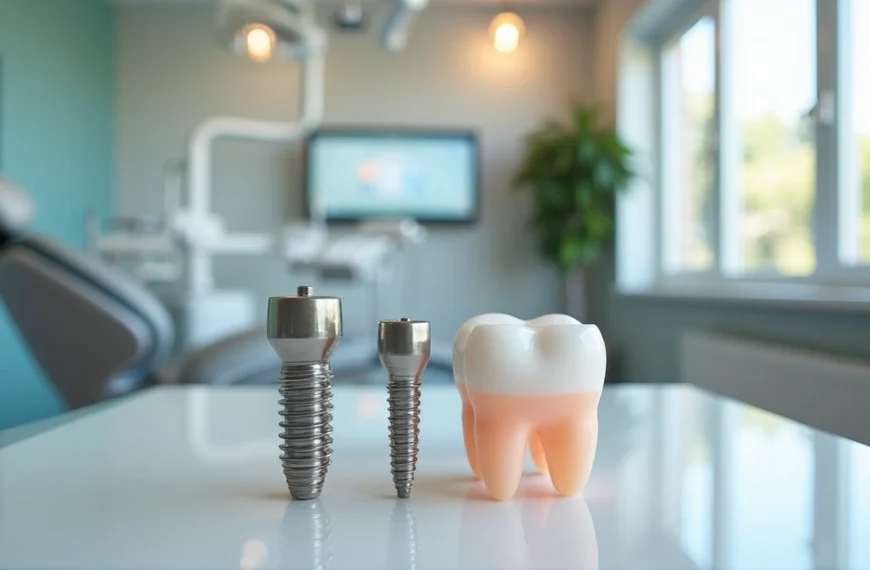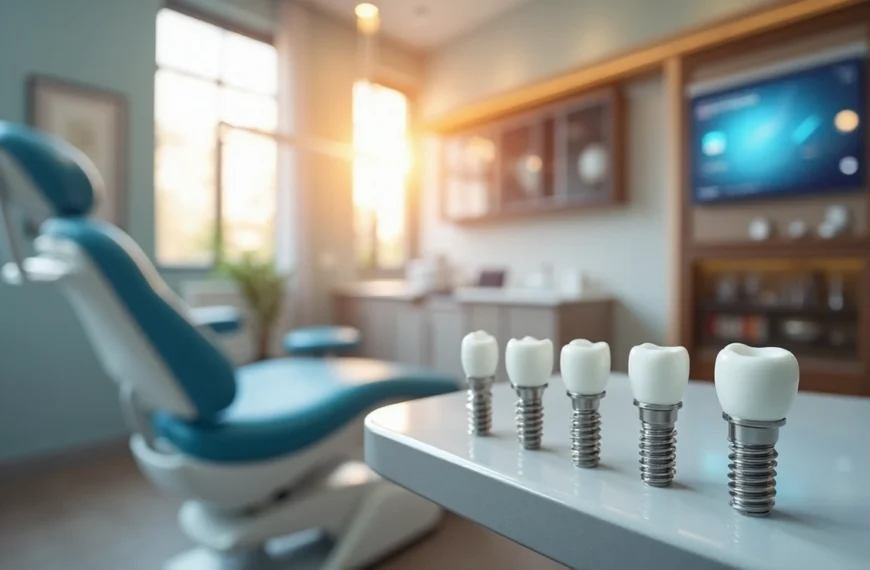Tooth loss impacts about 120 million Americans, which makes dental implants and dentures vital solutions for many people. The jawbone starts to disintegrate if missing teeth remain unreplaced. This leads to permanent bone loss that you can’t reverse.
Dental implants and dentures serve the same purpose, but they’re nowhere near alike in how they work. A dental implant lets you chew almost like natural teeth – about 85-90% as well. Dentures only give you 30% of normal chewing power. The costs tell a different story too. A single dental implant ranges from $1,600 to $2,200 per tooth. Standard dentures cost less upfront at around $1,000. You’ll need new dentures every 5-7 years though, while dental implants can last your whole life with good care.
This piece dives deep into what both options really cost and how comfortable they are to use. You’ll learn about the upfront costs, what you’ll spend over time, and how each option feels. We also look at personal factors that shape this choice. This helps you pick the solution that matches your oral health needs and lifestyle.
Understanding the Basics: What Are Dental Implants and Dentures?
Image Source: Maryland Holistic Dentist
People who need to replace missing teeth have different restoration options. Dental implants and dentures serve the same purpose but work in completely different ways.
How dental implants work
Dental implants act as artificial tooth roots that doctors make from titanium and place in the jawbone. These metal posts take the place of missing tooth roots and create a base for artificial teeth. The implant system has three main parts:
The titanium implant body that fuses with the jawbone
An abutment (connector post) that extends beyond the gums
A restoration such as a crown, bridge, or denture that attaches to the abutment
The unique feature of implants is osseointegration—a process where the jawbone grows and bonds with the implant surface. This natural fusion creates stability that lets implants work just like natural teeth. The implants also stimulate the jawbone when you chew, which helps prevent bone loss that usually happens after losing teeth.
How dentures are made and fitted
Dentures work differently as removable devices that replace missing teeth. Making them requires several precise steps:
The dentist takes impressions of the patient’s mouth to create plaster models. These models go on an articulator to show how the jaws fit together. Lab technicians arrange artificial teeth in wax to get the right fit and bite.
The approved wax model goes into a flask where the wax melts away and acrylic resin takes its place. The final step polishes the dentures to look natural. Patients can choose from several types:
- Full dentures replace an entire arch of teeth
- Partial dentures replace several missing teeth
- Implant-supported dentures attach to dental implants for better stability
Key difference between dental implants and dentures
The biggest differences between these options come down to permanence, stability, and long-term health effects. Dental implants become a permanent part of your mouth, unlike dentures that sit on gums and need adhesives or clasps to stay put.
Implants let you chew better and won’t slip when you eat or talk. They also keep your jawbone healthy by encouraging bone growth, while the bone under dentures can wear away over time.
Dental implants might cost more upfront ($1,600-$2,200 per tooth), but they can last a lifetime with good care. Dentures cost less at first but need replacement every 5-7 years.
Cost Breakdown: Upfront and Long-Term Expenses
Image Source: Dantkriti Dental Clinic Gurgaon
Money matters more than anything else when patients choose tooth replacement options. Patients need to understand both immediate costs and long-term expenses to make the right choice.
Original cost of dental implants vs dentures
These options come with very different price tags. A single dental implant costs between $3,000 and $5,000 per tooth. This includes the implant, abutment, and crown. Full-mouth restoration can cost more than $60,000.
Dentures are more available at first glance. Complete dentures cost $1,000 to $1,500 per arch, and partial dentures run $500 to $800. This is a big deal as it means that many patients choose dentures without thinking about long-term costs.
Hidden costs: maintenance, replacements, and adjustments
Patients often miss the ongoing costs they’ll face later. Dentures come with these expenses:
- Relining every 3-5 years costs $200-$500 per procedure
- You need new ones every 5-7 years
- Adhesives cost $100-$150 yearly
- Special cleaning products add $50-$100 each year
Dental implants need just regular dental check-ups that cost $100-$200 yearly, just like natural teeth.
Insurance coverage and financing options
Insurance plans treat these options quite differently. Standard policies often help pay for dentures, but they see dental implants as specialized procedures with limited coverage. You can pay through:
- Medical credit cards like CareCredit
- Special dental loans with APRs from 3.99% to 30.99%
- Health savings accounts (HSA) or flexible spending accounts (FSA)
Cost of dental implants vs dentures over 10 years
The financial picture looks different over a decade. Implants might cost more upfront, but they often save money in the long run. Dentures need constant maintenance and replacement every 5-7 years. The total cost could exceed implant expenses over ten years. Implants last 20+ years with good care, so you won’t face the repeated replacement costs that come with dentures.
Comfort and Daily Use: What to Expect
Image Source: Secure Dental
Living with replacement teeth means more than just thinking about costs. Your choice between dental implants versus dentures can change your daily life in many ways.
Eating and chewing efficiency
These two options work very differently when it comes to chewing. Dental implants let you use up to 95% of the chewing force that natural teeth provide. You can eat almost anything you want. Dentures only give you about 10% of normal chewing power, which limits your food choices by a lot.
Denture wearers often have trouble with tough foods like steak, raw vegetables, and nuts. They usually adapt by cutting food into tiny pieces or skipping certain foods entirely. People with implants can bite into apples or enjoy steak without worry. This affects not just how much you enjoy your food but also your nutrition and health.
Speaking and social confidence
Your speech changes based on which option you pick. Dental implants stay fixed in place, so you speak naturally without worrying about movement. This helps you feel more confident in social settings.
Dentures might slip or make clicking sounds while you talk, especially if they don’t fit well. Some people avoid social gatherings because they feel embarrassed. The stability makes a big difference in how freely people interact with others.
Cleaning and maintenance routines
Dentures take extra work. You must take them out after meals, brush them with special cleaners (not toothpaste), and soak them overnight. Your jaw shape changes over time, so dentures need professional adjustments.
Implants work more like natural teeth. You brush, floss, and get regular checkups. No special cleaning solutions or removal needed. Taking care of implants feels familiar, while dentures require learning completely new habits.
How they affect bone health and facial structure
The biggest difference might be how these options affect your jawbone. Implants stimulate your jawbone when you chew, which keeps it healthy. Your facial structure and appearance stay the same over time.
Your jawbone shrinks without this stimulation under dentures—up to 25% in just the first year. This shrinkage keeps happening, which can change how your face looks and make it appear sunken. You notice these changes more and more as time passes.
Who Should Choose What? Factors That Matter
Image Source: SAIGON IMPLANT CENTER
Picking between dental implants and dentures needs you to weigh several personal factors that lead to successful treatment and satisfaction. Your unique situation matters more than following a standard approach.
Age and lifestyle considerations
Your age plays a big role in whether dental implants will work for you. Young patients with developing jaws might not qualify since implants could interfere with natural growth patterns. The good news is there’s no age cap – many people in their 70s, 80s, and even 90s have gotten implants successfully.
Your daily habits can affect the outcome by a lot. Smoking makes healing harder and raises your risk of infections. Too much alcohol gets in the way of proper healing after implant surgery. Learning stress management helps implants succeed because high stress weakens your immune system and slows down healing.
Bone density and oral health
Your jawbone’s density is vital to dental implant success. The jawbone starts shrinking after tooth loss – you can lose up to 25% in just the first year where the tooth was. If your bone density is low, you might need bone grafting before getting implants.
Gum disease or poor oral care habits can make implants unstable. You’ll need to treat any existing issues and maintain good oral health before you can get implants.
Medical conditions and recovery time
Some health conditions can affect how well implants work. Diabetes that isn’t controlled makes natural healing difficult. Radiation therapy in your jaw area raises your risk of implant failure. If you have autoimmune diseases, osteoporosis, or hypertension, you’ll need a full evaluation.
Getting back to normal after implant surgery takes six to twelve months. Most people feel better within a week, but your implants keep settling into your jaw over several months.
Personal preferences and long-term goals
Your personal goals should guide this choice. If you want a permanent solution that feels like natural teeth, implants might be your best bet. Dentures could work better if you care more about cost and easy maintenance.
Dental implants make sense if you lead an active life and need stability. But if you’d rather have something you can take out and clean easily, dentures might suit you better.
Conclusion
Making Your Decision: Balancing Cost, Comfort, and Long-Term Health
The choice between dental implants and dentures comes down to several key factors. Dental implants just need a higher upfront investment, but their value often exceeds traditional dentures over time. A single dental implant costs between $3,000-$5,000 per tooth and needs minimal maintenance beyond regular oral care. Dentures might look budget-friendly at $1,000-$1,500 per arch. However, they need regular adjustments, replacements, and extra products that add up over time.
Your quality of life matters just as much as the cost. Dental implants give unmatched stability, offering up to 95% of natural chewing power compared to dentures’ mere 10%. This huge difference affects both eating enjoyment and nutrition. Implants also eliminate common denture problems like slipping while talking, bone loss, and changes in facial appearance as time passes.
Your personal situation should guide this most important decision. Your age, bone density, overall health, and lifestyle habits all affect which treatment suits you best. Patients with good bone structure, general health, and dedication to oral hygiene see excellent results with dental implants. In spite of that, people who want more affordable options or can’t have surgery might find dentures are a better fit for their needs.
Choosing dental restoration calls for a balance of current needs and future goals. Talking to dental professionals are a great way to get a full picture of your situation. Whether you choose implants for long-term performance or dentures for their accessibility, understanding these basic differences will give a solution that serves your oral health, comfort, and budget well for years to come.
FAQs
Q1. Are dental implants more expensive than dentures? Initially, dental implants are more expensive than dentures. A single tooth implant can cost around $3,000-$5,000, while a standard set of dentures may cost about $1,000-$1,500. However, when considering long-term expenses, implants can be more cost-effective as they require less maintenance and replacement compared to dentures.
Q2. How do dental implants and dentures differ in terms of comfort? Dental implants offer superior comfort as they function like natural teeth, providing up to 95% of normal chewing efficiency. They don’t slip or cause gum irritation. Dentures, on the other hand, may feel less comfortable, offering only about 10% of natural chewing efficiency and potentially causing discomfort or slippage during eating or speaking.
Q3. What are the main factors to consider when choosing between implants and dentures? Key factors include age, bone density, overall health, lifestyle habits, and personal preferences. Younger patients with good bone density and oral health are often better candidates for implants. However, those seeking a more affordable option or unable to undergo surgery might prefer dentures. Long-term goals and quality of life considerations should also guide the decision.
Q4. How do dental implants and dentures affect bone health? Dental implants stimulate the jawbone during chewing, helping to prevent bone deterioration. This preserves facial structure and appearance over time. In contrast, the bone underneath dentures can shrink significantly, potentially leading to changes in facial contours and a sunken appearance as years pass.
Q5. What are the maintenance requirements for implants versus dentures? Dental implants require standard oral hygiene practices like regular brushing, flossing, and dental check-ups, similar to natural teeth. Dentures, however, need daily removal, special cleaning with denture-specific products, overnight soaking, and professional refitting over time as jaw shape changes. Implants generally require less maintenance and don’t need special cleaning routines.
References
[1] – https://luxurydentistrynyc.com/dental-implant-candidacy/
[2] – https://www.omfsurgery.com/blog/how-old-is-too-old-for-dental-implants-your-total-guide/
[3] – https://www.humana.com/dental-insurance/dental-resources/dental-implant-coverage
[4] – https://my.clevelandclinic.org/health/treatments/10900-dentures
[5] – https://www.hotspringsdentist.org/how-dental-implants-boost-confidence-in-social-and-professional-life/
[6] – https://www.blvddentistry.com/dental-implants-vs-dentures-which-is-right-for-you/
[7] – https://www.healthline.com/health/dentures-vs-implants
[8] – https://www.aspendental.com/dental-care-resources/dentures-vs-implants/
[9] – https://www.carecredit.com/dentistry/
[10] – https://www.svetlanadental.com/blog/dental-implant-vs-dentures-cost/
[11] – https://ksdental.com/blog/real-cost-of-dentures-vs-implants/
[12] – https://affordabledentistnearme.com/what-you-need-to-know-about-hidden-fees-in-dental-implant-procedures/
[13] – https://www.affordabledentures.com/patient-support/payment-options
[14] – https://www.lendingclub.com/patient-solutions/dental-financing/dental-implant-financing
[15] – https://www.tolleydental.com/tolley-blog/dental-implants-vs-dentures/
[16] – https://www.drscharf.com/blog/implants-vs-dentures/
[17] – https://www.elegantedgedentistry.com/dental-implants-better-for-eating-than-traditional-dentures/
[18] – https://www.primesmiledental.com/post/nutrition-and-eating-habits-with-dentures-vs-dental-implants
[19] – https://my.clevelandclinic.org/health/articles/10901-denture-care
[20] – https://www.ddsgroupnyc.com/dental-implant-maintenance-keeps-implants-functional-and-clear-from-plaque-and-dental-diseases
[21] – https://www.dentiq.dental/get-a-detailed-comparison-between-dental-implants-dentures/
[22] – https://www.periocenter.com/blog/the-impact-of-dental-implants-on-jawbone-health-facial-structure-41/
[23] – https://jacksonvillecompletedentistry.com/dental-implants-can-keep-your-jawbone-healthy/
[24] – https://azoralsurgery.com/2023/08/03/the-importance-of-bone-density-in-dental-implant-surgery/
[25] – https://my.clevelandclinic.org/health/treatments/24303-implant-supported-dentures
[26] – https://www.andresendds.com/dental-implants-vs-dentures/














![No Win No Fee Lawyers: The Hidden Truth About Settlement Cuts Legal representation through no win no fee lawyers gives clients a way to fight cases without paying anything upfront. Many clients don't know that these services take a big chunk of money after winning the case. Lawyers usually take 25% to 40% of what you win as their contingency fee. The amount lawyers take from settlements can add up fast. A $100,000 settlement means your attorney gets $30,000 if they charge a 30% fee after winning your case. Your solicitor's cut might be £10,000 from a £30,000 compensation award, based on your agreement percentage. This payment model stays pretty much the same for no win no fee lawyers in different places, though percentages can change. This piece breaks down what you need to know about contingency fee deals. You'll learn about standard fee ranges, extra costs beyond the basic fee, and times when this payment setup might not work in your favor. Smart clients should think over these money matters before signing up with a lawyer to make better choices about their legal help. What No-Win No-Fee Really Means Image Source: Express Legal Funding A no-win no-fee arrangement, also called a Conditional Fee Agreement, changes the way people get legal help. This payment approach removes the need to pay legal fees upfront and creates a partnership between clients and their attorneys. How contingency fees work No-win no-fee agreements are based on contingency fees. Lawyers get paid only when they win compensation for their clients. Most lawyers take between 25% and 40% of the final amount, based on how complex the case is and where it's filed. Lawyers take their cut after winning the case. To name just one example, see a case where a lawyer wins £30,000 in compensation with a 33% fee - they would receive £10,000. On top of that, some law firms use sliding scales where they charge less for quick settlements and more if the case goes to trial. The law requires a written agreement before any work starts. This paperwork spells out the lawyer's percentage, what costs you'll need to cover, and other key details. What happens if you lose the case The meaning behind "no-win no-fee" is clear - losing your case means you won't pay your lawyer anything. All the same, you should know about a few money-related details. You won't owe your lawyer when you lose, but some deals might make you pay for court fees, expert witnesses, or other case expenses. The other side could also ask you to pay their legal costs. Many lawyers suggest getting "After Event" insurance to protect their clients. These policies cover any costs if you lose your case, which makes the no-win no-fee setup much safer. Why lawyers offer this model Lawyers want to make legal help available to more people, so they offer these payment plans. This setup helps people who don't have much money take legal action when they have valid claims. The payment structure motivates lawyers to work hard. They only get paid by winning cases, which pushes them to get the best results possible. Lawyers carefully assess each case before taking it on a no-win no-fee basis. They usually accept cases that have a good chance of winning, since they put in lots of time and resources without any guaranteed payment. The Real Cost: How Much Do Lawyers Take from a Settlement Image Source: Greiner Law Corp. The true cost of no-win no-fee legal representation becomes clear once we look at contingency fees. Many clients feel surprised to see a big chunk of their settlement checks going to their attorney's fees. Typical percentage ranges (25%–40%) No win no fee lawyers typically ask for 25% to 40% of the total settlement amount. Personal injury attorneys usually take 33.3% (one-third) of the awarded compensation[101]. Lawyers and clients agree on this percentage before any work starts on the case. Several factors shape the final percentage. Your chances of winning, case complexity, and the work to be done play key roles in determining the attorney's cut. Some areas have laws that cap the maximum contingency fees for specific types of cases. Sliding scale based on case complexity Law firms often use a tiered fee system that changes with the case stage and complexity. This scale rewards quick settlements while paying attorneys fairly if more work becomes needed. The fee might start at 30% if the case settles before lawsuit filing. This number could climb to 35% after filing or reach 40% if the case goes to trial. Law firms often group cases by complexity: 10%-20%: Simple cases with straightforward settlements 25%-35%: Typical personal injury cases 35% and above: Complex cases requiring extensive resources Examples of payout breakdowns These ground examples show how fees affect settlements: A $15,000 settlement with a 33.3% contingency fee.pdf) puts $5,000 in the attorney's pocket, leaving $10,000 for the client. Similarly, from a $100,000 settlement with a 33% fee, the attorney gets $33,000 while the client receives $67,000[102]. Complex cases tell a different story. A $100,000 settlement with a 30% fee plus $5,000 in extra costs leaves $65,000 for the client after all deductions. These fees substantially change the client's final payout. Hidden Costs You Might Not Expect Image Source: Nelson Personal Injury Lawyers Beyond percentage-based fees, clients often feel surprised by extra costs that can reduce their final compensation by a lot. These hidden costs show up in the fine print of no-win no-fee agreements. You should think over these details before signing. Court filing and expert witness fees Legal proceedings come with unavoidable court filing fees. These charges differ by jurisdiction. They usually range from $30 for small claims to several hundred dollars for complex civil lawsuits. Expert witnesses can be expensive, with hourly rates ranging from $150 to $1,000 based on their credentials and testimony complexity. Expert witnesses charge more for court appearances than consultation work because of added pressure and prep time. Clients might still need to pay experts for their prep work even if the case settles before trial. Medical report and investigation costs Medical documentation is a vital part of many legal claims. These costs include fees to release medical records, create specialized reports, and prepare documents. Investigation costs cover evidence gathering, police reports, witness interviews, and other fact-finding work needed to build a strong case. Of course, some firms say they'll cover these expenses upfront, but clients don't completely avoid these costs. When these costs are deducted from your compensation Law firms take these expenses from the settlement amount before they calculate their percentage fee, though each firm handles this differently. Some lawyers subtract these costs after figuring out their contingency fee, which changes how much money clients end up with. Most firms pay case-related costs during the process and get their money back from the settlement. The defendant usually pays most simple legal costs and disbursements in successful cases, but not always everything. Insurance protects clients from costs in unsuccessful claims at many law firms, but this protection isn't guaranteed. Clients should review their agreements carefully since they might still need to pay specific expenses even if they lose their case. When No-Win No-Fee Might Not Be the Best Option Contingency fee arrangements give many people access to justice. However, this payment model doesn't always work in a client's best interests. Knowing these limitations helps clients make better decisions about their legal representation. Cases with unclear liability Lawyer no win no fee arrangements work best in cases where fault is clear. We assessed the probability of success before taking contingency cases. Lawyers might turn down cases if there isn't enough evidence of the other party's negligence or if liability isn't certain. Cases with multiple responsible parties create more challenges. The situation gets complicated fast when several parties share liability. Lawyers are less likely to take these cases on contingency. They need to be confident they can prove the other party's negligence before accepting a case. Low-damage or low-payout claims Small claims often don't work well with the contingency model, even with real injuries. Cases that have minimal injuries or limited financial damages might not bring enough compensation to cover legal costs. The potential settlement needs to be big enough to pay for investigations, witness interviews and court fees. Personal injury lawyers often turn down cases where the "compensation potential" is too small. This doesn't mean the claim isn't valid - it just means the economics don't add up for a contingency arrangement. Situations where hourly billing may be better Hourly billing has clear advantages in certain cases. Clients see exactly what they're paying for - every hour worked and task completed. This model works well for cases that need lots of attention but don't have clear financial outcomes. Complex litigation with opposing parties works better with hourly billing and a retainer fee. Clients have more control over their case and don't feel pressured to settle quickly. Cases that need extensive preparation but have uncertain outcomes fit the hourly model better. Lawyers can spend the time needed without worrying about contingency limits. This approach often leads to better representation, especially for complex legal issues that need special expertise. Conclusion Understanding the Full Picture Before You Sign No-win no-fee arrangements offer legal representation without upfront costs. Of course, this seems attractive at first glance. In spite of that, you need to think about how these agreements can affect your final compensation. Legal fees usually range from 25% to 40% of your settlement - but that's just the start. You'll face more deductions like court filing fees, expert witness costs, and charges for medical documentation. What looks like a "free" service ends up taking a big chunk of your compensation to cover legal expenses. These arrangements work best in specific situations - cases with obvious liability, substantial damages, and solid evidence. If you have a low-value claim or complex liability issues, traditional hourly billing might serve you better. Without doubt, you should ask for clear explanations of all possible costs before signing anything. Read the fine print closely, especially when you have to deal with expenses in unsuccessful cases. Ask to see sample settlement breakdowns that show all deductions. This helps you picture what you might actually take home. Your choice to go with a no-win no-fee arrangement depends on your situation. This model helps if you don't have money to pursue valid claims. But if you have a strong case and enough funds, other fee structures might let you keep more of your compensation. Whatever payment model you choose, knowing exactly how much lawyers take from settlements helps you make better decisions. This knowledge lets you approach legal representation with real expectations and better control over your money. FAQs Q1. What percentage of a settlement do no-win no-fee lawyers typically take? No-win no-fee lawyers typically charge between 25% to 40% of the final settlement amount as their contingency fee. The exact percentage often depends on the complexity of the case and the stage at which it is resolved. Q2. Are there any hidden costs in no-win no-fee arrangements? Yes, there can be additional costs beyond the lawyer's percentage fee. These may include court filing fees, expert witness costs, medical report expenses, and investigation costs. These expenses are usually deducted from the settlement amount before or after the lawyer's fee is calculated. Q3. What happens if I lose my case in a no-win no-fee arrangement? If you lose your case, you generally won't have to pay your lawyer's fees. However, you might still be responsible for certain expenses like court costs or the opposing party's legal fees. Many lawyers offer insurance to protect clients from these potential costs in case of an unsuccessful claim. Q4. When might a no-win no-fee arrangement not be the best option? No-win no-fee arrangements may not be ideal for cases with unclear liability, low-value claims, or complex legal issues requiring extensive preparation. In these situations, traditional hourly billing might be more appropriate and potentially more cost-effective for the client. Q5. Can I negotiate the percentage a lawyer takes from my settlement? Yes, the contingency fee percentage is often negotiable. It's typically agreed upon and formalized in writing before the lawyer begins working on your case. Don't hesitate to discuss the fee structure with your lawyer and ask for a detailed breakdown of potential costs and deductions.](https://consumersweek.com/wp-content/uploads/2025/06/No-Win-No-Fee-Lawyers-The-Hidden-Truth-About-Settlement-Cuts-870x570.webp)

